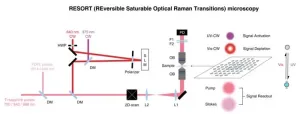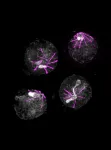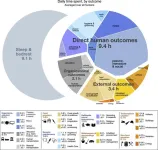(Press-News.org) Cancer cells are even smarter than scientists previously believed, according to new CU Boulder research. When these cells are confronted with potent new drugs called CDK2 inhibitors, which are designed to prevent cancer from proliferating, they can trigger a workaround to survive the assault in as little as one to two hours.
But the study, published June 8 in the journal “Cell,” comes with a silver lining.
It reveals how cancer cells complete this adaption and shows that simultaneously administering a second, already widely available drug may hobble cancer cells and shrink resistant tumors. The findings bolster the idea, which is currently under investigation in at least three clinical trials, that when it comes to treating resistant breast cancer, two drugs may be better than one.
“Our research suggests that you can potentially have a more effective treatment by combining these new CDK2 inhibitors in clinical development with a drug that already exists,” said senior author Sabrina Spencer, associate professor of biochemistry at CU Boulder. “It also uncovers a very basic, fundamental understanding about how the cell cycle is wired for robustness and why so many tumors manage to proliferate in the face of drugs meant to block proliferation.”
A promising new frontier in cancer treatment
The study, a collaboration with pharmaceutical company Pfizer Inc., centers around a class of new drugs called CDK inhibitors.
Cyclin-dependent kinases (CDKs), including CDK 4, 6, 2 and 1, are enzymes that usher all cells, such as skin or breast tissue cells, through the cycle of growth, division and replication. Each of the enzymes has its own function and place in the process, and scientists believe that 4 and 6 kick-start the cycle. When CDKs become overexpressed or dysregulated, they can drive tumor formation.
Since 2015, the U.S. Food and Drug Administration has approved three drugs to inhibit CDK4 and 6 (Palbociclib, Ribociclib and Abemaciclib), including for the most common subtype of breast cancer, known as HR+ HER2- (hormone receptor-positive, ERBB2-negative metastatic cancer).
The drugs have proven less toxic and more effective than previous treatments, propelling them to blockbuster status with billions of dollars in annual global sales.
But some patients don’t respond to them and many develop resistance, a fact that has prompted researchers to go after a different member of the enzyme family—CDK2.
In 2016, Pfizer began collaborating with Spencer, a global leader in time-lapse cell imaging, to study how cancer cells respond to their new CDK2 inhibitor. Spencer’s lab took pictures of living ovarian and breast cancer cells every 15 minutes over the course of two days.
Early on, a surprising discovery emerged.
While CDK2 activity plummeted in the cells upon initial exposure to the drug, within one to two hours, that activity began rebounding.
“This was the fastest adaptation we had ever seen,” said Spencer. “It was bizarre.”
While those findings were, initially, disappointing, the researchers continued their research for multiple years to determine what was causing this swift “drop-rebound” effect. It works a bit like a runner who re-enters a relay race to grab the baton from an injured teammate. When the drug disabled CDK2, CDK4 and CDK6 stepped back in to continue prodding the cells to proliferate.
Previous research has shown that when inhibitors take out CDK4 and CDK6, CDK2 comes to the rescue. The new study shows that the reverse is also true.
The power of co-drugging
In follow-up experiments, the team tried drugging cancer cells in petri cells and in tumors in mice with both CDK2 and CDK4/6 inhibitors.
In both cases, the tumors stopped growing.
The team is still exploring why that happens, but Spencer suspects that CDK4 and CDK6 may stand in the shadows throughout the cell cycle, ready to jump in and assist when CDK2 is impaired. She said CDK2 inhibitors in combination with CDK4/6 inhibitors could, ultimately, be used to help breast cancer patients that haven’t responded well to existing drugs, as well as those who responded well but then relapsed.
The findings also shed light on how other drugs could be combined for better results.
“The mammalian cell cycle is commonly conceived as a well-understood, hardwired, invariant pathway, but our work indicates that the cell cycle is much more plastic than generally believed, with multiple adaptive routes under different conditions,” said Spencer. “That’s useful information for any company trying to drug the cell cycle to treat disease.”
END
For resistant breast cancers, two drugs may be better than one
Study shows cancer cells can adapt to novel drugs called CDK2 inhibitors in 1-2 hours, but adding a second drug squelches the workaround
2023-06-16
ELSE PRESS RELEASES FROM THIS DATE:
UMass Amherst biostatistician developing statistical tools to predict breast cancer survival and inform targeted therapies
2023-06-16
Breast cancer is a complex disease, and its progression is difficult, yet important, to predict.
While many elements may contribute to a breast cancer prognosis, University of Massachusetts Amherst biostatistician Chi Hyun Lee has zeroed in on one risk factor that has emerged for its potential to predict the disease’s progression.
Lee will use a two-year, $154,791 grant from the National Institutes of Health (NIH) in an effort to develop statistical tools that will better predict breast cancer survival rates and survival time after breast cancer recurrence.
While the project focuses on breast cancer research, the proposed statistical ...
Jefferson Lab outreach efforts earn national recognition
2023-06-16
NEWPORT NEWS, VA – When the global pandemic put the kibosh on in-person events, the U.S. Department of Energy’s Thomas Jefferson National Accelerator Facility sought alternatives for ensuring its world-class science and unique equipment remained accessible. These efforts culminated in the Fall for Science Virtual Field Trip Event, which rolled out a virtual tour experience, new website, and unique supporting materials. Now, the event has been recognized by the Public Relations Society of America with three Anvil Awards.
According ...
Uncovering a cellular process that leads to inflammation
2023-06-16
Cedars-Sinai investigators have identified several steps in a cellular process responsible for triggering one of the body’s important inflammatory responses. Their findings, published in the peer-reviewed journal Science Immunology, open up possibilities for modulating the type of inflammation associated with several infections and inflammatory diseases.
Specifically, the investigators have improved understanding of the steps that lead to the production of IL-1 beta, a potent inflammatory protein signal released during many inflammatory responses.
“We now have a clearer understanding of the stepwise process that leads to the production of IL-1 beta,” said Andrea ...
New imaging technique is no last resort
2023-06-16
There are various ways to image biological samples on a microscopic level, and each has its own pros and cons. For the first time, a team of researchers, including those from the University of Tokyo, has combined aspects from two of the leading imaging techniques to craft a new method of imaging and analyzing biological samples. Its concept, known as RESORT, paves the way to observe living systems in unprecedented detail.
For as long as humanity has been able to manipulate glass, we have used optical devices to peer at the microscopic world in ever increasing ...
Abnormalities in neurodevelopment could lay the foundations for Alzheimer’s disease
2023-06-16
In the cerebral cortex, neurogenesis – the formation of neural cells from stem cells – begins in the fetus from 5 weeks gestation and is almost complete by 28 weeks. It is a complex process with finely tuned mechanisms. “In humans, neurogenesis lasts particularly long compared with other species, explains Khadijeh Shabani, a post-doctoral researcher at Paris Brain Institute. Neural stem cells remain in a progenitor state for an extended period. Only later do they differentiate into glial cells, astrocytes, or oligodendrocytes that will form the architecture of the brain and spinal cord.”
Until ...
Disorient the malaria parasite to prevent it from causing harm
2023-06-16
With almost 250 million cases a year, 621,000 of them fatal, malaria remains a major public health problem, particularly in sub-Saharan Africa. Malaria is a parasitic disease transmitted by mosquitoes and caused by a microbe of the genus Plasmodium. On its journey from mosquito to human, Plasmodium must adapt to the specificities of the many organs and cells it parasitizes. Microbes do not have sensory organs; instead, they have sensors made of proteins to detect molecules specific to the environments they colonize. While most living organisms share the same types of sensors, Plasmodium is an exception. Biologists at the University of Geneva (UNIGE) have identified a new type ...
Growing number of hypothyroidism patients receiving treatment other than levothyroxine
2023-06-16
The use of thyroid hormones other than the commonly prescribed hormone medicine levothyroxine to treat hypothyroidism, or underactive thyroid, is increasing, according to a study being presented Friday at ENDO 2023, the Endocrine Society’s annual meeting in Chicago, Ill.
“This is significant because the long-term health outcomes of these treatments are not as well known as levothyroxine,” said researcher Matthew Ettleson, M.D., of the University of Chicago in Chicago, Ill.
The thyroid makes the hormones triiodothyronine ...
Prevalence of metabolic associated fatty liver disease is increasing
2023-06-16
CHICAGO—The percent of metabolic associated fatty liver disease (MAFLD), the leading global cause of liver disease, is increasing in U.S. adults, according to a study presented Friday at ENDO 2023, the Endocrine Society’s annual meeting in Chicago, Ill.
Mexican Americans consistently had the highest percentage of MAFLD, especially in 2018, although the prevalence of increase was higher among Whites, the study found.
MAFLD, previously known as non-alcoholic fatty liver disease (NAFLD), is fast becoming the most common indication ...
The global human day – A bird’s eye perspective
2023-06-16
Everyone has 24 hours per day. Across the global population of 8 billion people this adds up to approximately 190 billion human hours per day. How those hours are spent determines the impacts we have on our surroundings as well as how we experience life. To find out how people around the world use their time, a research team led by McGill University has gathered and analyzed information about both economic and non-economic activities in order to estimate, for the first time, what a day in the life of the world looks like.
“At present, we are struggling to come to terms with global challenges, and that calls for fresh perspectives on how the world ...
Planned reform of EU pharmaceutical legislation: early market access and robust evidence need not be a contradiction
2023-06-16
The European Commission's stated aim is to improve access to innovative drugs at the national level throughout the EU. Firstly, according to the proposal for the reform of EU pharmaceutical legislation, there are still considerable differences in access between countries. Secondly, drug development has so far only been geared to a limited extent to the actual needs of patients. According to the German Institute for Quality and Efficiency in Health Care (IQWiG), the latter point is in line with the perspective of the ...
LAST 30 PRESS RELEASES:
Magnetic resonance imaging opens the door to better treatments for underdiagnosed atypical Parkinsonisms
National poll finds gaps in community preparedness for teen cardiac emergencies
One strategy to block both drug-resistant bacteria and influenza: new broad-spectrum infection prevention approach validated
Survey: 3 in 4 skip physical therapy homework, stunting progress
College students who spend hours on social media are more likely to be lonely – national US study
Evidence behind intermittent fasting for weight loss fails to match hype
How AI tools like DeepSeek are transforming emotional and mental health care of Chinese youth
Study finds link between sugary drinks and anxiety in young people
Scientists show how to predict world’s deadly scorpion hotspots
ASU researchers to lead AAAS panel on water insecurity in the United States
ASU professor Anne Stone to present at AAAS Conference in Phoenix on ancient origins of modern disease
Proposals for exploring viruses and skin as the next experimental quantum frontiers share US$30,000 science award
ASU researchers showcase scalable tech solutions for older adults living alone with cognitive decline at AAAS 2026
Scientists identify smooth regional trends in fruit fly survival strategies
Antipathy toward snakes? Your parents likely talked you into that at an early age
Sylvester Cancer Tip Sheet for Feb. 2026
Online exposure to medical misinformation concentrated among older adults
Telehealth improves access to genetic services for adult survivors of childhood cancers
Outdated mortality benchmarks risk missing early signs of famine and delay recognizing mass starvation
Newly discovered bacterium converts carbon dioxide into chemicals using electricity
Flipping and reversing mini-proteins could improve disease treatment
Scientists reveal major hidden source of atmospheric nitrogen pollution in fragile lake basin
Biochar emerges as a powerful tool for soil carbon neutrality and climate mitigation
Tiny cell messengers show big promise for safer protein and gene delivery
AMS releases statement regarding the decision to rescind EPA’s 2009 Endangerment Finding
Parents’ alcohol and drug use influences their children’s consumption, research shows
Modular assembly of chiral nitrogen-bridged rings achieved by palladium-catalyzed diastereoselective and enantioselective cascade cyclization reactions
Promoting civic engagement
AMS Science Preview: Hurricane slowdown, school snow days
Deforestation in the Amazon raises the surface temperature by 3 °C during the dry season
[Press-News.org] For resistant breast cancers, two drugs may be better than oneStudy shows cancer cells can adapt to novel drugs called CDK2 inhibitors in 1-2 hours, but adding a second drug squelches the workaround





